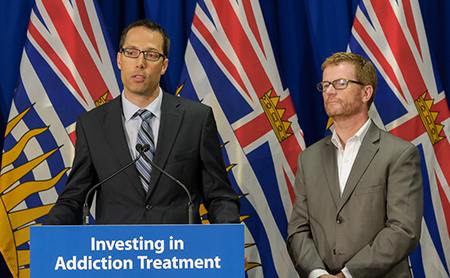
Evan Wood (left), accompanied by B.C. Health Minister Terry Lake, speaks at the announcement of provincial and U.S. funding for research and training in addiction medicine.
The Province of British Columbia is providing $3 million to UBC and the B.C. Centre for Excellence in HIV/AIDS to expand an addiction medicine education and research training program for clinicians, making it the largest in North America.
The province-wide effort, which has also received $2.5 million from the National Institutes of Health, will be led by Evan Wood, Professor of Medicine in the Division of AIDS and Canada Research Chair in Inner City Medicine.
The program will seek new ways to treat substance dependence and related health concerns, through several components:
- Professional education in addiction medicine: The British Columbia Addiction Medicine Training Program, based out of UBC, St. Paul’s Hospital and Vancouver Coastal Health, will expand existing addiction medicine training programs for physicians, and also expand to other health professional training (nurses, psychologists and social work trainees). The additional funding will create a provincial-level diploma program for physicians and others caring for patients with addiction.
- The Rapid Access Addiction Medicine Program: Based at St. Paul’s Hospital, it will offer specialized support for patients and families seeking assistance, as well as physicians who need to consult with addiction specialists in caring for their patients. It will incorporate a telehealth system to allow consultations for medical practitioners across the province.
- An addiction clinical trials hub: Based around the emerging addiction clinical trials infrastructure and addiction clinician scientist programs at St. Paul’s Hospital and UBC, the hub recognizes the need for more evidence-based treatments for opioid (e.g. oxycontin, heroin), alcohol and stimulant addiction (such as cocaine and methamphetamine). One of its first trials, funded by the U.S. National Institutes of Health, will investigate a new medication called Vivitrol, a monthly intra-muscular injection that blocks the effects of alcohol or heroin, and is already available in the U.S. to treat opioid and alcohol dependence.
- An addiction research training program for clinician-scientists, funded by the U.S. National Institutes of Health.
 “Addiction is not something that happens in the Lower Mainland alone, but is something seen province-wide,” says Dr. Wood, Co-Director of the Urban Health Research Initiative at the BC Centre for Excellence in HIV/AIDS at St. Paul’s Hospital. “This is why today’s announcement is about strengthening supports at the front lines, to support any British Columbian seeking help to deal with an addiction. That is our best hope of intervening early to reach British Columbians with mild-to-moderate substance use disorders before they develop more complex problems requiring more intensive treatment.”
“Addiction is not something that happens in the Lower Mainland alone, but is something seen province-wide,” says Dr. Wood, Co-Director of the Urban Health Research Initiative at the BC Centre for Excellence in HIV/AIDS at St. Paul’s Hospital. “This is why today’s announcement is about strengthening supports at the front lines, to support any British Columbian seeking help to deal with an addiction. That is our best hope of intervening early to reach British Columbians with mild-to-moderate substance use disorders before they develop more complex problems requiring more intensive treatment.”
Additionally, today’s funding sets the stage for the establishment of a Network for Excellence in Substance Dependence and Related Harms. This first-of-its-kind Canadian model will focus on integrating medical education, scientific research and clinical care to reduce the health and social harms of untreated addiction. The centre will also create an interdisciplinary platform to build capacity for addressing related health issues like mental illness and communicable diseases such as Hepatitis C and HIV.
“There is an abundance of new knowledge available in the area of substance use disorder treatment. Today’s announcement will lead to translating that information into evidence-based and patient-centred care,” says Health Minister Terry Lake. “With the expertise and leadership of Dr. Wood and his colleagues in expanding the number of skilled addiction medicine providers and developing new ways of helping patients, I am confident that B.C. will remain a leader in addiction treatment education, research and clinical supports.”
Half of the $3 million is for training of addiction care providers and the other half is for a clinical trial network and rapid access support model to support early intervention for patients. This funding builds upon a $3 million donation from Goldcorp Inc. that was made in 2012, which enabled the establishment of the St. Paul’s Hospital Goldcorp Fellowship in Addiction Medicine, which is western Canada’s only American Board of Addiction Medicine accredited clinical training programs. The province’s support has also helped enable $2.5 million in funding from the U.S. National Institutes of Health to support addiction research and care.
The network will be a virtual network of care providers and researchers around the province linked through a hub-and-spoke model, integrating the Faculty of Medicine’s distributed medical education program and the expertise based at St. Paul’s Hospital and Vancouver Coastal Health to provide broad-based provincial reach.